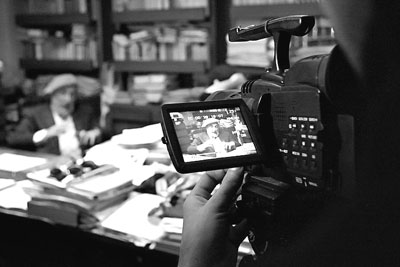|
Non-accidental death of a monarch<
Blow to the heart, not an accidental death of a monarch is a historical documentary with a difference. Interviews and analysis across the film are two different directions. The first is examining the life of Gaetano Bresci and the regicide of Umberto I, with the clear intention to tell the character, virtually forgotten by history books, and analyze a difficult situation that Italy has been living in the King Umberto era. The other is the political analysis of the gesture: the desire for redemption, the individual action beyond the propaganda of the fact, the inability to remain helpless in the face of terrible injustice. Contextualize a gesture to this day, beyond the sovereign and powerful. Anyone live in a gesture, such as Bresci, revolutionary strength to say enough and bring down the symbol ...

 Andrea Staid
Andrea Staid
The dichotomy human-animal
The Edge of the human: the animals and death (Shadows Court - Mapping, Verona 2010. Pp. 95. 10 euro) Massimo Filippi’s is not a book in one dimension. It has the peculiarity of the petition, the pace of the test animal, the welter of Nietzsche's aphoristic form. But is not none of that. It is an intersection between the free intellectual speculation and daily practice - the author, besides being a physician and researcher, is an activist (Isa) for animal rights, is essentially a diary of intellectual experience.
Appears as a literary essay, for example by reading the paragraph Fragments from a logbook (pp. 77-79), in which Philip builds a sense of a vast new compound extracted, as complex intellectual landscape, but is not actually literature. It uses the German word Umwelt (p. 12) as "subjective universe" or, as seems Jakob von Uexkull, "biological foundation that is in the exact epicenter of the communication and the significance of the animal-man (or not), but does not reduce everything to a simple style "philosophically significant."
The liminality suggested by the title is neither space nor superficial, and does not attempt to reconstruct a map of death or inscription of animal rights. It is a lithograph of the contemporary, vital, rough, so it looks like a Dance of Death in a modern way. Filippi plays with the "ultimate limit," death, in which biopower, perhaps zoo-power intervenes, as has already been adequately examined Foucault's narrative, in his time, including surveillance, punishment and the history of sexuality.
 Ettore Brocca Ettore Brocca
Translation and summary by Enrico Massetti (Web site on "The other Fabrizio de Andre") |

